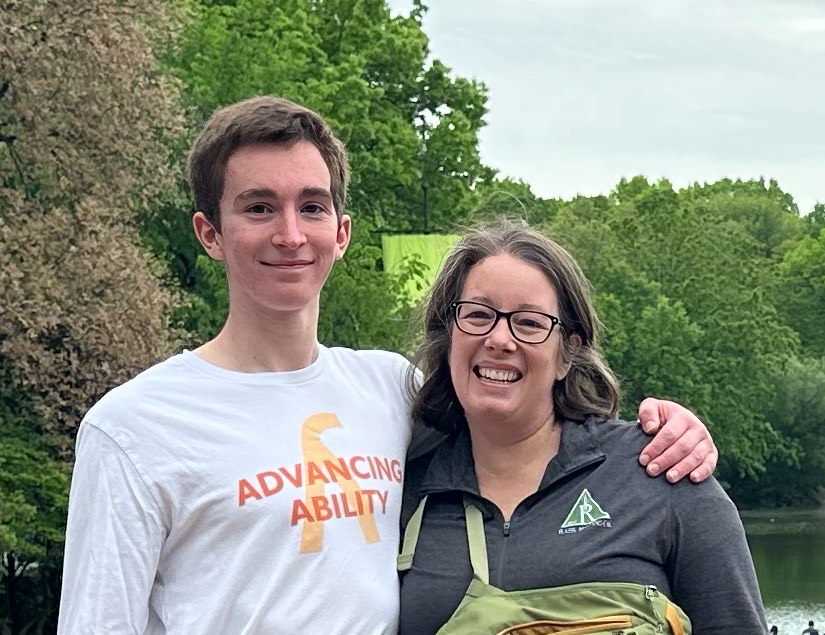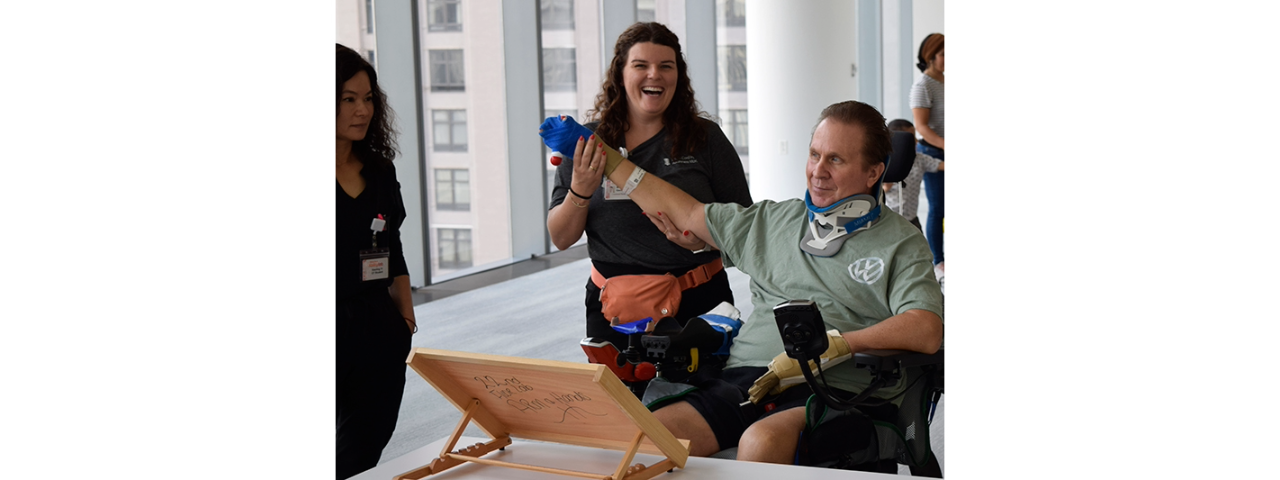Body
As part of Shirley Ryan AbilityLab’s regular “Ask the Expert” series, community members submit questions via social media to clinicians, researchers and — from time to time — to patients and family members connected to the hospital.
The latest featured expert is Amy Basken, who has been a patient advocate since she began her career as a speech therapist more than 25 years ago. Amy co-founded a patient advocacy organization to help influence patient engagement policy on a national level.
A few years ago, Amy’s son, Matthew, experienced a traumatic brain injury (TBI) and came to Shirley Ryan AbilityLab for rehabilitation. From that moment, her work became more personal than she ever could have imagined.
In the following Q&A, as well as in this video on Instagram, Amy shares her experiences as a mother of a person living with a TBI:
What was your biggest goal for your son to achieve in his recovery during therapy?
Body
My biggest goals for Matthew changed significantly over time. For the first two weeks, it was simply that he would survive his catastrophic brain injury. Once we got to Shirley Ryan AbilityLab, the goals shifted to making him as independent as possible. If we are being real, I was pretty scared of the idea of having to be his caregiver for the rest of his life.
How did you find community support — and address your own needs during your son’s recovery?
Body
What I discovered is that by allowing others to help me in a truly helpless situation, they are healing, too. So, here are a few things we did:
Received communication support: One thing that was very helpful to our self-care was having someone else manage our communication — not only when Matthew was in the ICU, but during all of his rehabilitation. I found it exhausting and overwhelming to share information with friends and family over and over, especially later in recovery when newsworthy progress went from daily to weekly to monthly. My dearest friend, Stephanie, did a wonderful job managing our care page and handling the outsiders who meant well, but I didn’t have the bandwidth to deal with at the time. This was even helpful as Matthew transitioned to come home.
Created a help list: The second thing that was very helpful was creating a specific list of ways people could help — channeling people’s desire to give in ways that really mattered to us. While the list included practical things like gift cards, I think the most fun of all was getting a digital picture frame and asking people to email pictures of Matthew from throughout his life. It was a wonderful source of love, laughter and conversation. It also humanized him during his most challenging days.
Prioritized mental health: One more thing about self-care and recovery that I want to address is the long-term mental health impact. Brain injury is a big deal for everyone. It impacts all of your relationships and your own psyche. I’m still seeing a therapist as new things come up that need processing. As the psychologist at Shirley Ryan AbilityLab suggested, Matthew really is living a great life. He just isn’t the same person he was and never will be, and I’m working on being ok with that.
What did you find most surprising about TBI recovery?
Body
What surprises me the most about TBI recovery is the brain’s ability to heal. At each new step in Matthew’s recovery, I would get this pit in my stomach that he would be stuck at this stage — yet time and time again I would be surprised when he kept getting better.
I read somewhere that the most healing would come in the first 18 months, and I was pretty sad when he still had problems with his high-level thinking at that point in time. While it’s true that at 18 months the big changes had slowed, we still are seeing improvements three years later.
What advice do you have for someone at the beginning of their TBI caregiver journey?
Body
For those who are just starting on their brain injury journey, I have a few pieces of advice that served us well:
First, while there will be very hard days, find the good things and choose hope. Each day, hope will be there — just look for it.
Second, build positive relationships with everyone on the care team. Make them your best friends. They can coach you through the hard times, laugh with you during the good and build trust so you can ask questions.
And, ask lots and lots of questions!
How is your son doing now?
Body
Matthew is doing better than anyone ever expected. We had a miraculous journey.
After six weeks of intensive care, six weeks of inpatient rehabilitation at Shirley Ryan AbilityLab in a very altered state of consciousness and five months of intensive outpatient therapy, Matthew gradually emerged.
He has now returned to living on his own 200 miles away and is looking forward to graduating from college this spring. He has worked hard to minimize what I would perceive as limitations and is accomplishing his own goals now.

What is your favorite activity to do on a typical day with your son?
Body
My favorite activity to do with Matthew on a typical day is walking, as I don’t take it for granted.
When we first arrived at Shirley Ryan AbilityLab, he was confined to his bed with limited movement. Within 24 hours, they had him harnessed to the ceiling and simulated the movement of walking on the treadmill.
Something kicked in, and after that we walked for hours and hours — on the treadmill, through the halls, on the staircases and at the park down the street. I believe this walking made all the difference in his recovery, and we celebrate it today.

